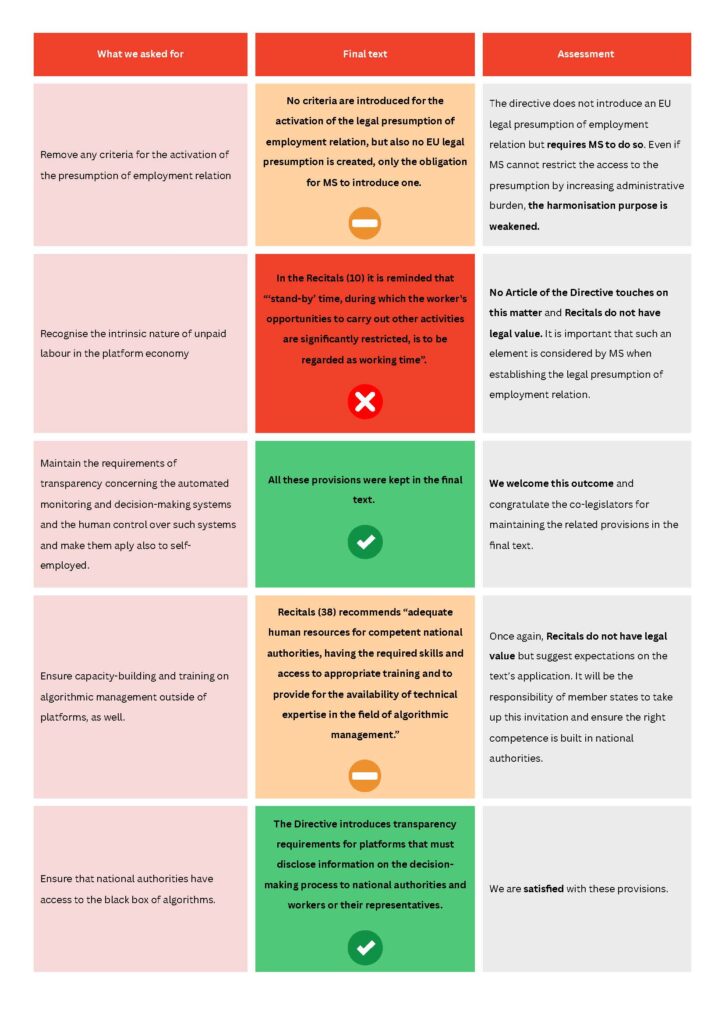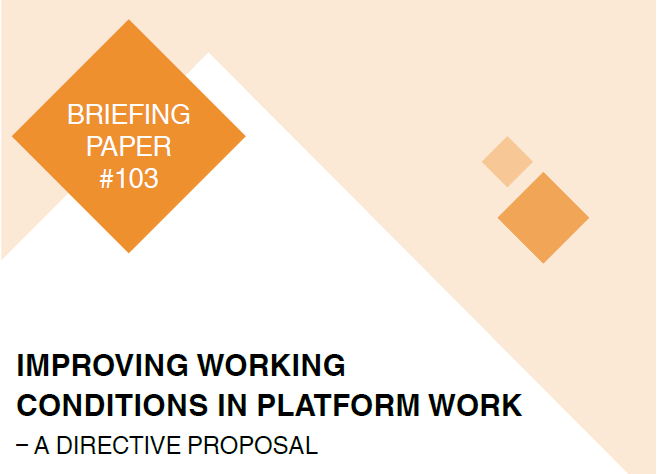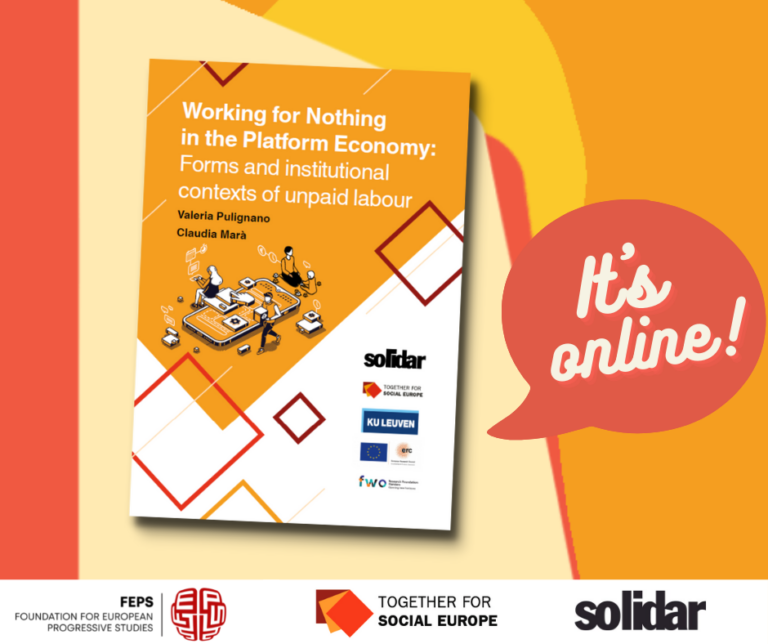The EU finally sees platform workers: member states should not be short-sighted in transposing the directive
On 24th April the European Parliament plenary formally voted in favour of the Directive to improve working conditions in platform work, moving one step closer to the final adoption of this piece of legislation, which at this stage only awaits the formal vote by the Council.
The deal on the text was reached after a bumpy and long road that took an unexpected turn on 11th March with the agreement found in the Council. On that day, during the EPSCO Council (composed of ministers responsible for employment, social affairs, health and consumer policy from all EU member states) two member states, Greece and Estonia, changed their position and voted in favour of the agreement, unlocking the legislative process and ensuring that it came to a conclusion before the end of the current EU mandate. The Directive, proposed by the European Commission in December 2021, met quite some resistance from the Council as some member states, notably France, were against setting a rebuttable presumption of employment relation at EU level. But what does the Directive foresee in the end? And to what extent will it improve working conditions for platform workers?
The text agreed on in March was negotiated by the co-legislators in February and consisted in a watered-down version of the Directive as proposed by the European Commission and definitely a less bold text than the one proposed by Parliament. The most contentious aspect of the file was the so-called legal presumption of employment relation, contentious to the point that different versions of the directive were voted down multiple times by member states before getting to the final compromised version.
What does this mean for platform workers?
The Directive aims, among other things, to prevent that workers are falsely classified as self-employed, not having access to their social rights as employees (including minimum wages, sick leave and pension contributions), while at the same time not enjoying the conditions of a genuinely self-employed, such as the freedom to set their remuneration or their working hours. In short, the Directive aims to avoid exploiting workers and breaching their social rights.
For this reason, the text proposed by the Commission foresaw a list of 5 criteria that would imply an employment subordination and proposed that if at least two of them are met the legal presumption of employment relation is triggered, which means that the workers would be considered as employed unless demonstrated otherwise by the platform (which would carry the burden of proof). However, actors such as SOLIDAR, Social Platform and ETUC advocated for the criteria to be removed, not to introduce too restrictive conditions for the presumption to apply. The European Parliament, in its report, followed this ask and removed the criteria. However, it reappeared instead in the position of the Council, which introduced 7 criteria out of which 3 needed to be met for the presumption to be triggered, making it even more difficult to apply.
The final text does not contain any criteria for the application of the presumption, going in the right direction. At the same time, the directive in the agreed form provides that member states “establish an effective rebuttable legal presumption of employment that constitutes a procedural facilitation to the benefit of persons performing platform work”. This provision will oblige member states to introduce the legal presumption mechanism, but it does not support in any way the harmonisation of such mechanisms across the EU, defeating the purpose of granting better conditions to all platform workers in the Union. On a positive side, “Member States shall ensure that legal presumption does not have the effect of increasing the burden of requirements on persons performing platform work, or their representatives, in proceedings ascertaining their employment status”. This reduces the risk that member states introduce criteria for the application of the presumption, for instance.
Algorithmic management
The chapter of the Directive that concerns algorithmic management has been less contentious than the one on the employment relation, but it is equally important, and its provisions are quite ambitious. In this sense the Directive is groundbreaking as it is the first piece of legislation regulating the usage of workers’ data in the workplace. Most importantly, its provisions extend also to (genuinely) self-employed workers contracted by the platforms, ensuring that privacy and rights of workers are protected regardless of their employment status. Among the protections introduced by the Directive there are:
- Limitations on the kind of data that the platform can process (psychological state, personal information, private conversations, information related to workers’ exercise of fundamental rights such as right to association, etc.);
- Requirements of impact assessment and transparency on the rules and usage of the automatic decision-making system on workers’ rights;
- Obligation of human oversight on the decisions taken by the algorithm to ensure that the impact of such decisions is evaluated and mediated by a (a competent and trained) human;
- Obligation to disclose information on the functioning of the platform and on the decisions taken by it if required by the workers or their representatives, namely trade unions.
SOLIDAR’s assessment:
Below we compared what we recommended decision-makers to integrate in the final text with the Directive’s provision:

Next steps and conclusions:
In conclusion, the Directive on improving working conditions in platform work can be considered as a positive outcome even just for the fact that it saw the light during the current mandate despite the many obstacles encountered. In terms of its content, SOLIDAR celebrates the inclusion of provisions that for the first time discipline the usage and protection of workers’ data and that provide for the human oversight of automated decisions and impact assessment of algorithmic management. The text is less satisfactory when it comes to the legal presumption of employment relation, as it gives consistent leverage to member states to introduce it on their own terms, failing to ensure homogeneous treatment of platform workers across the EU. At the same time, the obligation to introduce such presumption of employment relation constitutes an advancement of platform workers’ rights as it equips workers across the Union with an important tool to resist bogus self-employment.
Much of this initiative’s success depends on the level of ambition that member states will put into its transposition. Member states will have two years for the transposition of the Directive into the national legislation from its adoption and SOLIDAR calls on member states to do so keeping the protection of platform workers’ rights as the main guiding principle and not to give in to the pressure that big digital platforms will put into the process to weaken the Directive where possible.
SOLIDAR and its progressive members support the involvement of trade unions and relevant CSOs in the transposition and implementation phases to ensure that the Directive has the best possible impact on platform workers’ lives.






